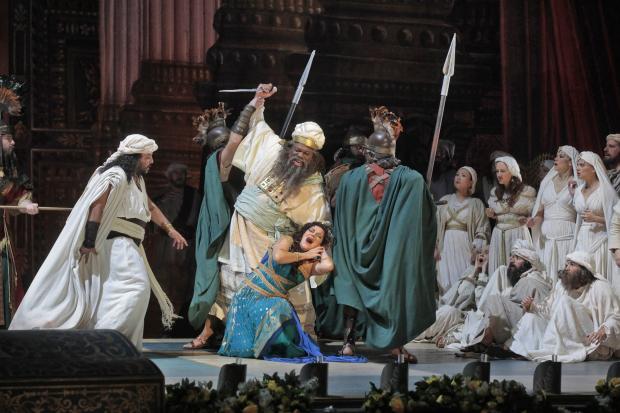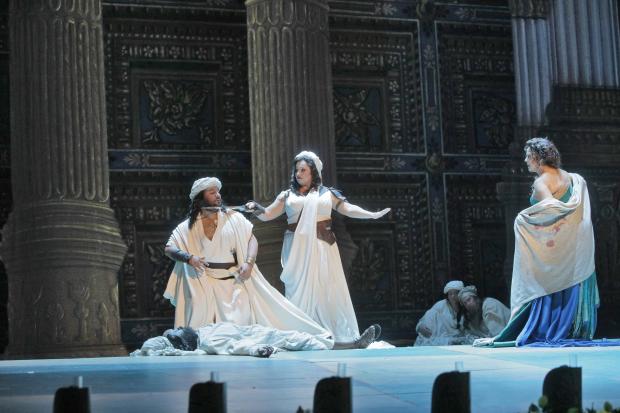Advertisement
With its third production of the season at the Dorothy Chandler Pavilion LA Opera remains on a roll. Giuseppe Verdi’s Nabucco is another eye-popping extravaganza, with director and designer Thaddeus Strassberger’s optically opulent sets that not only recreate and evoke ancient Jerusalem and Babylon during biblical times (like D.W. Griffith did for his 1916 masterpiece about man’s inhumanity to man, Intolerance), as well as simultaneously suggesting 19th century Italy. In particular, Milano’s famed Teatro alla Scala, where Nabucco premiered in 1842.
This is significant because Nabucco (our splendid Spanish Plácido Domingo, here playing the title character as a bearded baritone with braided hair) is an explicitly political piece, with librettist Temistocle Solera presenting the Old Testament era oppression of the Hebrews as a very obvious metaphor for the Austro-Hungarian Empire’s domination of the north of Italy, where Milano is located. Although many will find religious overtones in this three and a half hour-plus spectacle with two intermissions, Verdi and Solera clearly had the unification of Italy - called the Risorgimento, or “resurgence” - in mind in creating this rabblerousing opera. Indeed, this patriotic opera can be seen as a rallying cry not only for the downtrodden Israelites but for all national liberation struggles from Catalonia to, ironically, today’s Palestinians.
And with the title character’s narcissistic, megalomaniacal ascension to power, claiming that he has surpassed even god, Nabucco is reminiscent of the nascent nazi-wannabe currently inhabiting (but not for long!) the White House (who is headed for a downfall similar to Nabucco’s). Nabucco, of course, was short not for Nabisco, but for that other shrewd cookie, Nebuchadnezzar (605-562 B.C.), the king of Assyria, who rebuilt Babylon (interestingly, located in present day Iraq - or at least what’s left of it, after 15 years-plus of Yankee decimation). You can read the whole Megillah in the Talmud, a central text of Rabbinic Judaism. In terms of acting and vocalizing, our beloved treasure Plácido remains in fine form and a delight to behold.
In addition to stellar scenery, Mattie Ullrich’s glorious costumes help transport us back in time. Morris Robinson is attention-grabbing as Zaccaria, spiritual leader of the Hebrews - an interesting stage transition as he previously portrayed the Islamic zealot Osmin in LA Opera’s 2017 production of Mozart’s The Abduction from the Seraglio. (Oy!) Be that as it may, having the Atlanta-born Robinson portray an Israelite seer lends new meaning to the much-vaunted Black-Jewish alliance (America’s two most liberal ethnic voting blocs). Robinson’s rendition of “Sperate, o figli,” exhorting his people to remain resolute in their resistance, is inspiring.
Other dramatis personae include the fab Nancy Fabiolo Herrera from Canary Islands, Spain, who sings like a canary portraying Nabucco’s younger daughter, Fenena. Liudmyla Monastyrska from Kiev, Ukraine, makes her LA Opera debut as Fenena’s older sister, Abigaille. Guatemalan Mario Chang portrays Ismaele and Romanian Gabriel Vamvulescu depicts the High Priest of Baal (if memory serves correctly, Baal was also the title of the first play by German dramatist Bertolt Brecht, which Sacred Fools did a gripping production of some years back). Perhaps part of Nabucco’s theme deals with paganism versus monotheism: Whose illusion is the superior one? But it will take a far superior Talmudic scholar than I to determine this.
Verdi’s rich music, of course, is sonorous, with conductor James Conlon and chorus director Grant Gershon eliciting bravura performances from what seems like a Cecil B. DeMille-like cast of thousands in this Biblical epic. Especially melodious and pleasing to the ear and heart is Verdi’s “Va, Pensiero” – the Chorus of the Hebrew Slaves, which became an anthem of the Italian struggle for independence, similar to how John Lennon’s “Give Peace a Chance” was the signature song of the anti-Vietnam War movement.
[SPOILER ALERT!] BTW, here’s a tip to opera goers - don’t leave your seats until the final curtain closes as there’s a special follow-the-bouncing-ball via the supertitles treat as a bonus added feature, a grand finale. All in all, Nabucco is “exhibit A” as to how artists can set a saga far away and long ago and still say something relevant to their own time and place. And, in the case of Verdi’s spectacle, have it remain thematically and politically pertinent 175 years later. Viva Catalonia libre!
Nabucco will be performed Nov. 8 and Nov. 11 at 7:30 p.m. and Sunday Nov. 19 at 2:00 p.m. at L.A. Opera at the Dorothy Chandler Pavilion, 135 N. Grand Ave., Los Angeles, CA 90012. See: https://www.laopera.org/season/1718-Season/Nabucco/.
Highlights of LA Opera’s 2017/2018 Season include:
- Candide is part of Leonard Bernstein’s centennial celebration and our commitment to always including a contemporary work in every season.
- Orpheus and Eurydice is a co-production with Lyric Opera and includes the Joffrey Ballet
- Matthew Aucoin will conduct Rigoletto, his original work Crossing will be presented at the Wallis Annenberg Center for the Performing Arts.
- An adaptation of Ingmar Bergman’s classic film Persona at REDCAT, Nov. 9-12.
- Off Grand’s double bill of Gordon Getty’s Usher House and Canterville Ghost at The Broad Stage.
- A recital with Renee Fleming in February, along with an Audra McDonald concert slated in May.
For details see: https://www.laopera.org/season/1718-Season/.


